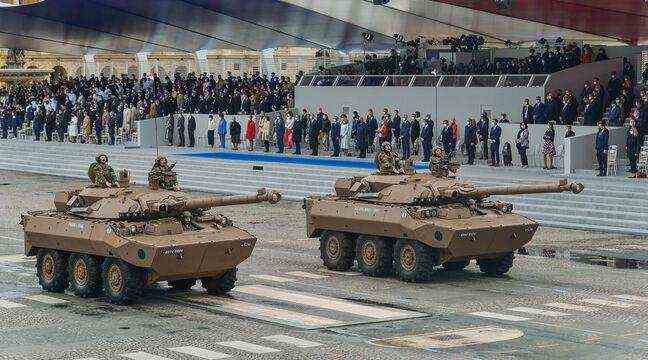A project that makes you cough. On July 14, the European Commission proposed to reduce CO2 emissions from new cars in the EU to zero from 2035, which would cause the commercialization of gasoline and diesel vehicles to stop on that date. This measure, which is part of a larger legislative package aimed at combating global warming, has enraged car manufacturers. It also made some Internet users react.
A particularly viral post indeed parallels the Brussels project and the floods that have hit Western Europe in recent days: we see the photo of two military rescue vehicles submerged in muddy water that arrives, for the first to the bonnet, for the second to the windshield. The two machines advance despite everything on what seems to be a neighborhood square transformed into a lake. According to our research, it was taken at
Kordel, a town in Rhineland-Palatinate, western Germany, on July 15, and initially posted by the district of Trier-Saarburg on its Twitter account. In the viral Facebook post, the comment that accompanies the cliché is ironic: “It’s going to be funny to send help with electric vehicles in 2035 …”
But will military and emergency vehicles be affected by the ban on heat engines wanted by the European Commission?
FAKE OFF
To find out, we went to the source (no pun intended), that is to say to the European Commission, which replied that “the Commission’s proposal establishing new emission standards for CO2 for cars and vans […] does not propose any substantial modification of the scope of this regulation ”with regard to military and emergency vehicles.
In detail (to find here), we learn that “the scope” of European regulations relates to “market surveillance of motor vehicles and their trailers”. However, “vehicles designed and constructed or adapted for use only by the armed forces are not covered by the regulation” in question. “For vehicles designed and built or adapted for use by civil protection services, firefighters and forces responsible for maintaining public order, legislation is not compulsory. “
So, to sum up, military and emergency vehicles are not affected by the measures envisaged by Brussels. Until now, because the proposals of the European Commission must now be debated by the European Parliament and the Member States. Debates that will last several months.

